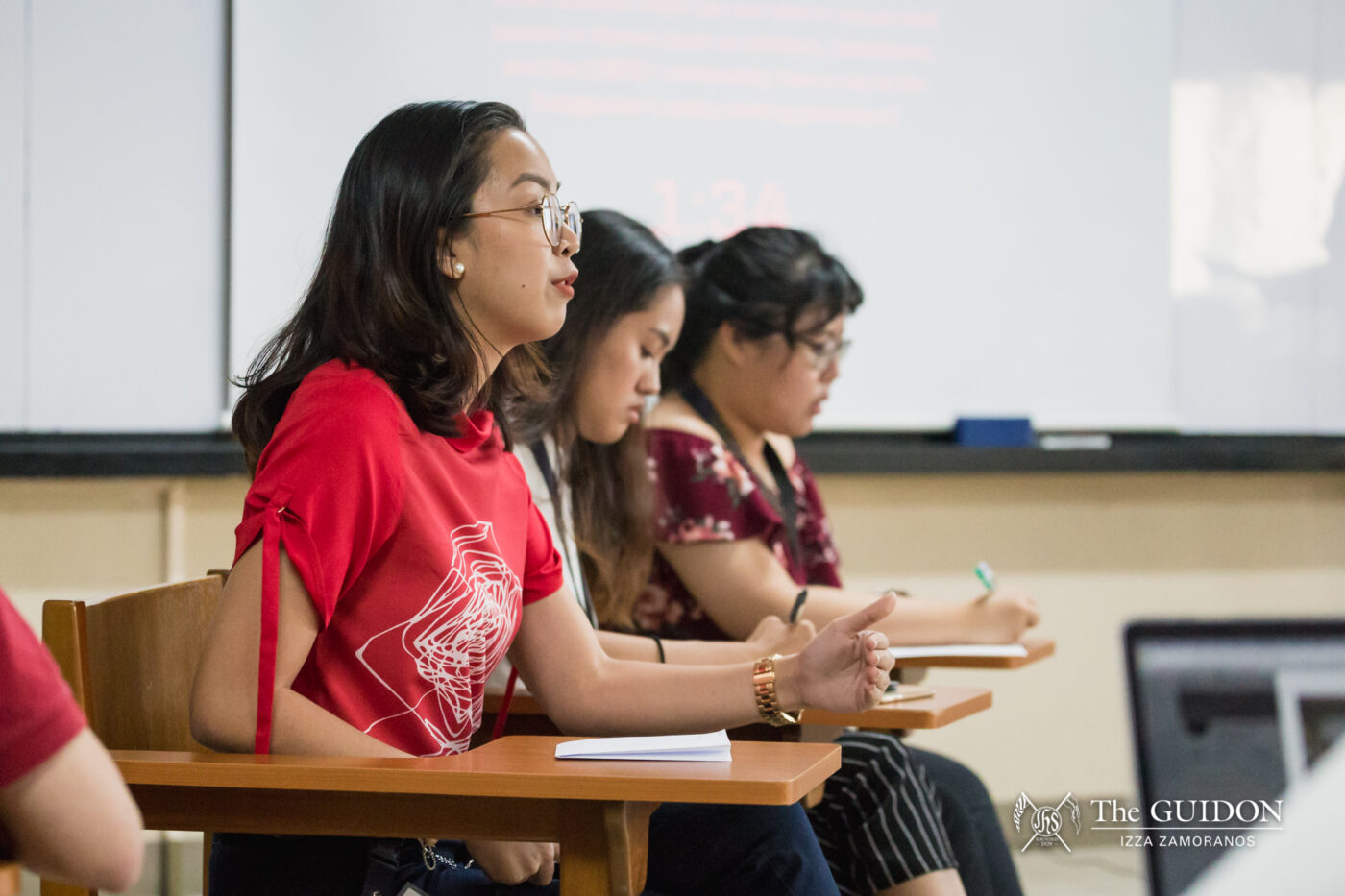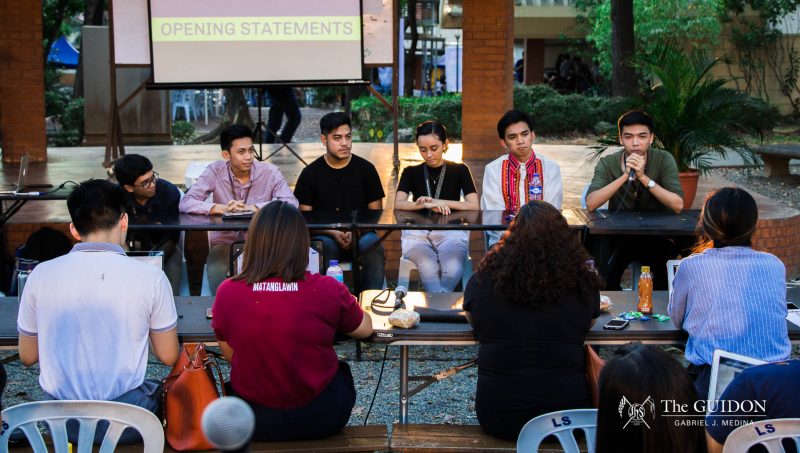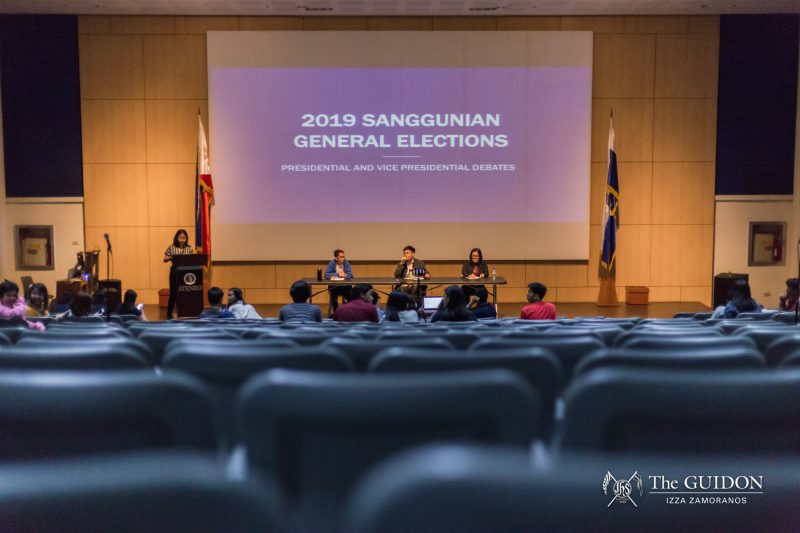SCHOOL REPRESENTATIVE candidates took the spotlight in the School Representative (SR) debates held at CTC 408 last Friday, March 8.
Sharing their stances on a variety of issues on and off campus were Union of Students for the Advancement of Democracy (USAD) candidates Kat Moreno for School of Social Sciences (SOSS) representative, Mica Torres for the John Gokongwei School of Management (SOM) representative, and Ed Agay for School of Humanities (SOH) representative. There are no candidates for the School of Science and Engineering (SOSE) representative.
The panelists for the final leg of the Sanggunian’s debate series included The GUIDON’s News Editor Angel Andaya, Features writer Kayla Cadenas, and Inquiry Editor Nio Atrigenio.
On student welfare
The beginning of the debate proper was marked by discussions tackling students’ rights and career opportunities.
Moreno was asked a question regarding concrete steps that can be taken to ensure the involvement of sectors in Ateneo in the Sanggunian’s legislative processes. In response, Moreno stated that providing sectoral representatives seats in the Central Assembly (CA) is a pivotal step in ensuring that the voices of sectors in Ateneo, including scholars, transferees, and the LGBTQ+ community, are taken into account. “[Sectoral representatives] are the ones responsible for data gathering and understanding their opinions of what their sectors want and need from policies,” she said.
Following this, another question directed to Moreno tackled concrete measures on encouraging the student body to engage more with the Sanggunian’s existing Sabihin sa Sanggu (SSS) initiative instead of turning to the ADMU Freedom Wall (FW) platform. In response, Moreno discussed her plan to initiate more dialogue with the Office of Student Affairs (OSA) on the underlying reasons for sexual harassment cases and the tendency for students to course sensitive matters through ADMU FW. Moreno argued that although the ADMU FW can be misused for the fabrication of stories, it must not be shut down as this only denies students their freedom to speak.
In addition, she mentioned the need for the reestablishment of the SOSS council, a legislative body that addresses SOSS students’ concerns, to narrow the gaps between the SOSS student body and the University administration. Moreno proposed to hold more town halls, as these would provide additional opportunities for students to build their trust in the Sanggunian as an avenue for forwarding their complaints. Along with this, Moreno plans to better the Sanggunian’s transparency with the student body throughout the processing of filed cases.
This was followed by a question directed to Agay on the declining number of course representative candidates. To mitigate this, Agay proposed for a modification of the Introduction to Ateneo Culture and Traditions (InTACT) modules to encourage first-year students to run for course representatives. “We need to go to InTACT and work with them on the modules to see if they do address this concern,” she explained.
However, Panelist Atrigenio pointed out that first year students may not yet completely grasp the problems and needs of each course. Agay, then, responded by asserting that freshmen offer a “new perspective” because of the recent curriculum changes.
In response to the same question, Moreno added that the politicization of the student body is key to encouraging more students to run for positions in the student government. She acknowledged that although politicization does not occur right away, measures like the SSS and discussions with the University administration can encourage this.
Another question that was forwarded to Agay touched on subsidies and how transparency can be practiced throughout the application process. She mentioned her plans for implementing a more inclusive system for the Sanggunian Academic Subsidy (SAS) applications wherein coverage will not be limited to students’ thesis projects. Agay also aims to open applications to all student organizations that need financial assistance for their projects.
Following this, Torres was asked about what concrete steps she has in mind to better address the complaints forwarded by students through SSS, considering the “supposed lack of action from the University administration.” Torres responded by proposing the creation of a Marketing and Promotions Department and a Student Concerns Department in the Sanggunian. She highlighted the essence of the Sanggunian’s role in promoting utmost transparency and providing a safe space for students to air out their concerns. “Students need to see steps, what is happening, and what more can be done,” she emphasized.
Despite some cases reaching resolution through SSS, Torres stated that SOM students still hesitate to course their concerns through the Sanggunian. “The main dilemma is that people don’t know who exactly to approach,” she explained. With that, she restates the need for an effective delineation of the Sanggunian’s internal departments.
The first round of the debates culminated with Torres’ proposal to strengthen the Commission on Anti-Sexual Misconduct and Violence (CASMV) and lobby for the integration of more gender inclusivity fora and similar workshops into the first-year students’ InTACT classes.
Addressing platform concerns and campus issues
The succeeding round of the debate proper revolved around the role of the candidates’ platforms in finding solutions for long-running campus issues.
A concern raised towards Moreno was the lack of SOSS-oriented career fairs for SOSS students and its failure to come to fruition despite past SOSS representatives’ promises to address this issue. In response, Moreno restated the need for a reestablishment of the Sanggunian’s SOSS Council as well as a partnership with the University administration for connections to firms that may be willing to participate in a SOSS-oriented career fair. Organizing teams for SOSS-oriented career fairs will also be opened to SOSS students to ensure wider representation of the school’s various courses.
Another audience member asked Moreno about possible avenues that can enhance research culture in the University. In response, she proposed facilitating more open dialogue with SOSS Dean Fernando Aldaba, PhD on dedicating financial assistance to research through the current Sanggunian’s Research Partnership Program (RPP), an initiative that funds joint projects of student-organizations and the SOSS Sanggunian.
This was followed by a platform-specific clarification from Panelist Andaya on the feasibility of her proposal to initiate an inter-university exchange program, similar to Ateneo de Manila University’s Junior Term Abroad (JTA) and Summer Term Abroad (STA) programs. Moreno stated she plans to involve students from other local universities and that the implementation of this program shall recenter students’ focus on their national contexts.
Agay’s positions on career opportunities for SOH students were drawn into the conversation with the next round of debate questions. Referring to Cadenas’ comment about how the Ateneo Career Fair does not cater to SOH students, Agay stressed the importance of finding the root of the problem through discussions with school administration and forming strong external partnerships that are more inclusive of SOH students’ needs. She suggested the organization of a SOH Career Fair during SOH Week to extend better opportunities to her constituents.
Tensions rose after Panelist Cadenas voiced her confusion about which organization is responsible for the lack of a SOH-centric career fair, a sentiment she believes is shared by her fellow SOH students. After Agay clarified that SOH Sanggunian was not involved in planning this school year’s career fair, Cadenas lamented the lack of transparency on the issue. “All we heard was that we were going to have a career fair, and then we didn’t,” she said. “For a lot of people in my batch, we did blame Sanggu, and now we’re hearing that it isn’t even your fault.”
Another initiative proposed by Agay is the creation of the Coalition of Artists, a body dedicated to politicizing students through the creation and exhibition of socio-political art. Agay sees this coalition as a potential remedy to the perceived lack of participation in the Sanggunian not only from SOH students, but the entire student body as well. “Art is a powerful tool, not only understood by SOH, but all schools,” said Agay.
In response to hearing Agay’s plans for a coalition of artists, Cadenas questioned the potential redundancy of the Coalition. “If I’m part of an art organization and already make politicized art, why should I still join?” asked Cadenas. Agay did not respond.
Another question was raised to Agay by Twitter user @itsjessmehoney regarding the sudden change in SOH leadership, referring to former SOH Representative Bianca Pamfilo’s formal resignation last January 2019. Agay first refused to divulge additional information. However, after further prompting from an audience member, Agay provided her reasons for refusing to disclose this information. “I will keep this general to respect her privacy; it had to do with her mental health and workload. We should give her time to heal,” she explained.
Attention shifted towards Torres in the next round of questions, as concerns about the constitution of the John Gokongwei Student Enterprise Center (JSEC) Association, contractualization, and JSEC employees’ rights emerged at the forefront of the discussion. Torres lauded the inclusion of a dropbox initiative–a system designed to receive feedback directly from JSEC employees–in the constitution, but called for more measures to ensure the protection of their welfare. Torres also floated the potential creation of an unconditional cash transfer system to secure employee compensation and vowed to find solutions and insights not only from within SOM but from SOH, SOSE, and SOSS as well. She chose not to disclose the particulars of these proposals as they are still in the planning stage.
Another question for Torres touched on issues surrounding SOM Week’s supposedly toxic environment. Torres recognized these concerns and underlined the need for a collective effort in solving this. “I am encouraging members of COA to participate in Sanggu meetings to have a better view of what can be done to mitigate the toxic competition-based nature of SOM Week,” she said. When asked about her concrete plans to foster a healthier dynamic, she emphasized the need to meet with organization leaders and participants involved in SOM Week in order to better understand their experiences. “I don’t think the current state [of SOM Week] is conducive to growth. The orgs deserve a chance to show what they stand for without having to step over each other,” she said.
Upon hearing of Torres’ efforts to curb SOM Week “hostility” in favor of more growth, Panelist Atrigenio questioned what the organizations’ incentive to participate would be should SOM Week’s competitive aspect die down, since organizations already focus on growth all year round. Torres acknowledged that no solution is currently in the works as of the moment and reiterated the necessity of a stronger relationship with the Business Cluster (BC) organizations.
Concretizing involvement in the political climate
The conversation took a contentious turn in the open forum segment of the debates, when sensitive issues headlined by the red-tagging of students and tuition-related concerns slid into focus.
Andaya initiated the discussion by asking each candidate to share their thoughts on the barriers to the socio-political involvement of Ateneans. In response, Moreno posited that students lack awareness of how these issues directly affect them. She pointed to better information sharing and helping students realize the power of their actions as ways to engage them more. Similarly, Agay asserted that students are “stakeholders in the future of our country,” and reiterated the Sanggunian’s duty to empower its constituents. Following this, Torres called for greater plurality of voices, particularly those that present more alternative views. “There [have] to be more avenues for people to vocalize their perspectives, even though they may be outside the status quo,” Torres said.
Later on, an audience member asked for Moreno’s comments on tuition fee hikes and her plans to address this issue. “I am against tuition fee increase, but it is inevitable. One of its causes is inflation… we have to understand that,” Moreno stated.Audience member Matt Demavivas (3 AB Dip IR) then stressed that tuition hikes have been applied by the University administration even before the Duterte administration’s implementation of the Tax Reform for Acceleration and Inclusion (TRAIN) Act. To this, Moreno committed to representing the students’ position in tuition fee negotiations with the school administration to ensure that development does not come at the expense of the students.
The evening’s debates reached its boiling point when the issue of alleged red-tagging and the threat on student safety and press freedom took over the discussion. Agay already came under fire earlier when she refused to comment on the same issue. After Matanglawin Editor-in-Chief Jessica Gayo prompted Agay through a tweet for more information, Agay again withheld a direct answer. “I don’t think this is the right avenue to talk about this… Given the political climate now, red-tagging is too sensitive a topic to point to a person. It would somehow bring danger to the people involved if named,” she explained.
In response, Andaya emphasized the candidates’ responsibility to be transparent to the student population. “As aspiring public figures, shouldn’t you be ready to talk about topics like this? It would be more dangerous not to talk about [these topics]. The students deserve to know. They expect you to have responses to these concerns and to at least acknowledge them through avenues like [debates],” she said.
In search of more concrete resolutions from the candidates, a question was directed to all candidates asking about specific steps the Sanggunian can take to protect its constituents. Moreno and Agay both vowed to work closely with school administration to work on special security measures and contingency plans in case action is taken against any student. Torres did not comment further.






